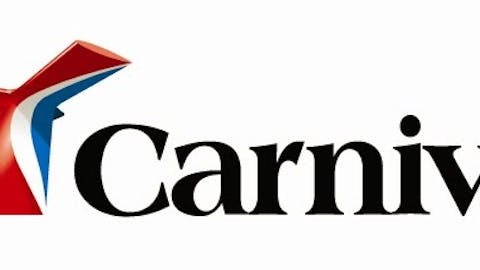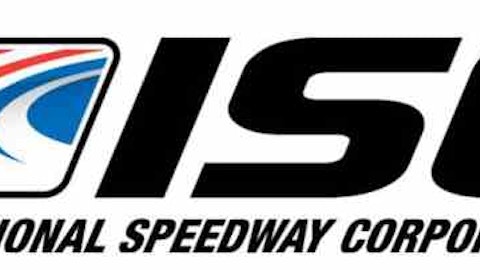NASCAR was hit hard by America’s recession, but that doesn’t mean track owners aren’t making money — it’s just that they’ve had to be more creative to do so. While admissions sales have declined, broadcasting revenues have increased — and even with a slow economy there’s still lots of money to be made.
So let’s take a quick look at three ways NASCAR track owners bring in the revenue.
Race-day ticket sales
When the recession took the steam out of NASCAR ticket sales, International Speedway Corporation (NASDAQ:ISCA) was one operator of several that reduced the seating capacity at some of its tracks to create more demand. At Daytona International Speedway Corporation (NASDAQ:ISCA) reduced capacity by 46,000 — about a third of all seating — by ditching the back-stretch seats and increasing the size of existing ones.

Las Vegas Motor Speedway. Source: Chief Master Sgt. Gary Emery (public domain).
But even with the decline, International Speedway Corporation (NASDAQ:ISCA) made $66 million from tickets sales from January to May this year — but that’s down from almost $69 million from the same time last year. Likewise, Dover Motorsports, which operates Dover International Speedway Corporation (NASDAQ:ISCA) and Nashville Superspeedway, brought in $4.86 million in admission sales in the second quarter of this year — but that’s down from $5.32 million the same time last year.
With admissions sales on the decline — although still lucrative — track owners have looked to bring in additional revenue during events.
Event-related revenues
Although ticket sales are an important revenue stream for track owners, there are still other ways to make money. While not all of the companies that own NASCAR tracks report event-related revenue in the same way, this category can include things such as luxury suites, merchandise, concessions, and catering.
Tracks such as Las Vegas Motor Speedway and Texas Motor Speedway — both owned by Speedway Motorsports, Inc. (NYSE:TRK) — have luxury RV spots that provide a great view of the track, as well as TV feeds, wireless Internet, and a concierge — for a mere $15,000. The price includes things such as pre-race pit passes for the coveted Sprint Cup races and other special membership access.
Aside from entertaining racing fans, Dover Motorsports hosted the Firefly Music Festival at its Dover, Del., track back in June, which helped the company earn $4.64 million in event-related revenue in the first six months of this year — up by $559,000 from the previous year.
Broadcasting revenue
Aside from admissions sales, broadcasting revenue is one of the prime ways for NASCAR track owners to bring in revenue. Broadcasting revenue includes radio and television transmission of the races from any of the tracks that Dover, Speedway Motorsports, Inc. (NYSE:TRK), or International Speedway Corporation (NASDAQ:ISCA) owns.

Auto Club Speedway (formerly California Speedway). Source: Soldiersmediacenter (Creative Commons).
In NASCAR, 65% of the money the association brings in from selling the rights to broadcasters goes to the tracks. The money is then divided based on a three-tier system — with the most of the money theoretically going to the tracks with the largest markets, biggest ratings, and historical significance.
In the second quarter of 2013, Dover Motorsports reported more than $15 million in broadcasting revenue — up from $14.4 million year over year. And in 2013, Speedway Motorsports, Inc. (NYSE:TRK) is expected to earn $199 million from broadcasting revenue alone. The nice part about broadcasting revenue for the track owners is that it’s an almost-guaranteed moneymaker, even if attendance is down.
NBC just signed a $4.4 billion deal with NASCAR back in July to start broadcasting races in 2015. That deal came as ESPN is ending its eight-year broadcasting run with the association. The Sports Business Journal reported that ESPN decided not to bid for the broadcasting rights because of declining NASCAR viewership. So as attendance is dropping and TV ratings are down, it seems that while still making large sums of money, track owners will need to continue to adapt their business model to keep the racing sport lucrative.
The article 3 Ways to Make Tons of Money Owning a NASCAR Track originally appeared on Fool.com is written by Chris Neiger.
Fool contributor Chris Neiger has no position in any stocks mentioned. The Motley Fool recommends International Speedway.
Copyright © 1995 – 2013 The Motley Fool, LLC. All rights reserved. The Motley Fool has a disclosure policy.




